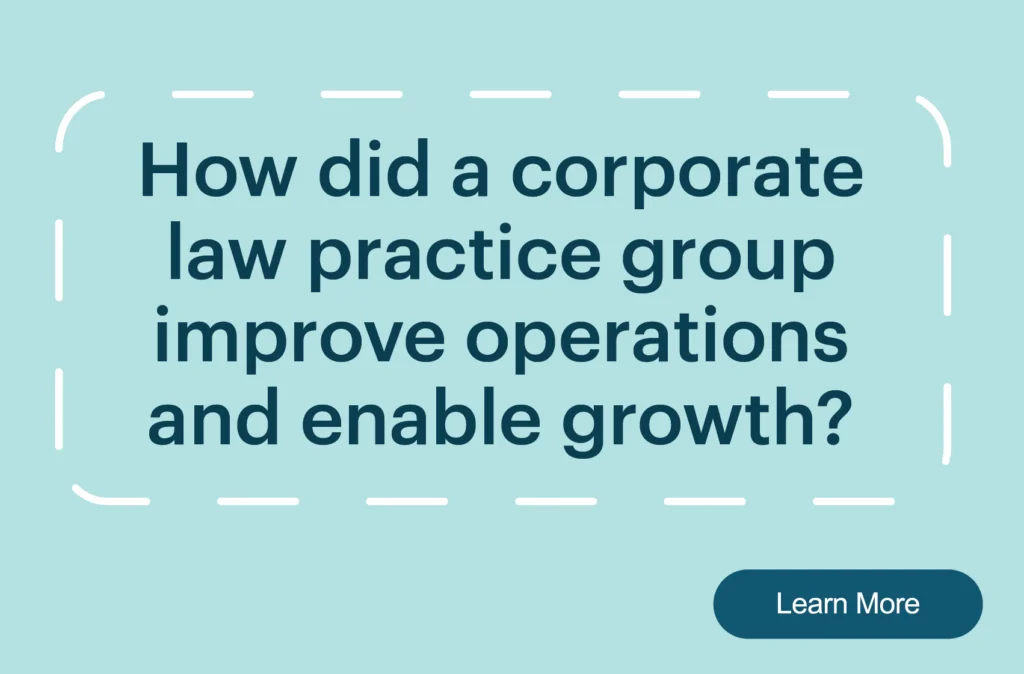The Future of Legal Project Management
Legal project management plays an increasingly critical role in law firms and legal departments, helping legal teams deliver services with greater efficiency and quality. As technology continues to evolve, staying ahead of emerging trends is essential for legal project managers to continue driving meaningful impact and adapting to new ways of working. This article highlights key trends shaping the future of legal project management, offering valuable context for those leading legal operations today.
Increasing Adoption of Technology, AI Integration, and Automation
Technology continues to advance the capabilities of legal project management, introducing new opportunities to streamline workflows and enhance matter management. Tools such as workflow automation and AI-powered task management are enabling teams to work more efficiently by reducing manual tasks and improving accuracy.
Looking ahead, the integration of AI and advanced data analytics will further expand the role of legal project managers. AI-driven insights will assist in managing deadlines, forecasting budgets, and automating repetitive tasks, freeing legal project managers to concentrate on strategic initiatives that deliver higher value. Importantly, thoughtful adoption of these technologies, alongside existing systems, will identify opportunities for significant operational efficiencies and improve overall project outcomes.
Greater Emphasis on Client-Centric Project Management
Clients today expect transparency and predictability, making client-centric project management a priority. Legal project managers are increasingly using real-time dashboards and collaborative platforms that allow clients to stay informed and engaged throughout the lifecycle of their matters.
This emphasis aligns closely with billing models, such as fixed fee project-based agreements, which require firms to deliver consistent, measurable results on time and within budget. Legal project managers play a central role in helping firms meet these client expectations and build lasting relationships by facilitating clear communication and visibility.
Integration of Cross-Functional Teams and Expanded Collaboration
As legal matters grow more complex, collaboration across diverse teams – including compliance, finance, pricing, innovation, and practice management – is becoming more common. Legal project managers are supporting this trend by introducing agile and flexible project management approaches tailored to the legal environment.
Future legal project management roles will increasingly act as connectors, working closely with multiple departments to enhance firm-wide efficiency and deliver tailored solutions that meet evolving client needs. These practices emphasize frequent communication, iterative progress, and adaptability. By facilitating collaboration across varied stakeholders, legal project managers help mitigate risk, drive innovation, and enable legal teams to respond effectively to changing priorities and complex challenges.
Data-Driven Decision Making and KPIs
Data continues to enhance the precision and impact of legal project management. Increasingly, legal project managers are utilizing key performance indicators such as budget adherence, resource utilization, and matter cycle times to monitor project progress and identify opportunities for improvement.
The ability to interpret and act on data empowers legal project managers to optimize workflows, enhance accountability, and demonstrate their contributions to firm goals. Investing in data literacy is becoming an important aspect of the profession’s ongoing growth.
Focus on Continuous Learning and Professional Development
The dynamic nature of legal project management requires ongoing professional growth. Advances in technology, shifting client expectations, and evolving operational models require legal project managers to regularly update and expand their skill sets.
Beyond targeted training and certification programs, an increasing number of conferences and industry events specifically tailored to legal project managers provide valuable opportunities for networking, knowledge sharing, and exposure to emerging best practices.
- ILTACON: National Harbor, DC (August 2025)
- LVNx: Chicago (September 2025)
- KM&I: New York (October 2025)
Active engagement with these professional communities helps legal project managers stay informed, sharpen their expertise, and adapt to new challenges. This ongoing commitment to learning not only supports sustained success but also strengthens their position as essential contributors within their firms.
Conclusion
The future of legal project management is being actively shaped by emerging technology and AI integration, a stronger focus on client transparency and accountability, expanded cross-functional collaboration, data-driven insights, and continued learning. For those already leading legal projects effectively, understanding these trends provides valuable perspective to continue enhancing their impact and to navigate future opportunities smoothly.
Workstorm is uniquely positioned to help legal project managers embrace these trends. Its integrated platform combines advanced workflow automation, customized reporting dashboards, and real-time collaboration tools to streamline project delivery and enhance visibility. By enabling seamless cross-functional communication and providing tailored project dashboards, Workstorm enables legal project managers to enhance operational efficiency, elevate client satisfaction, and lead their firms with confidence amid changes in the legal industry.
To learn more about how Workstorm can support your goals, connect with us for a personalized demonstration and explore next steps.


